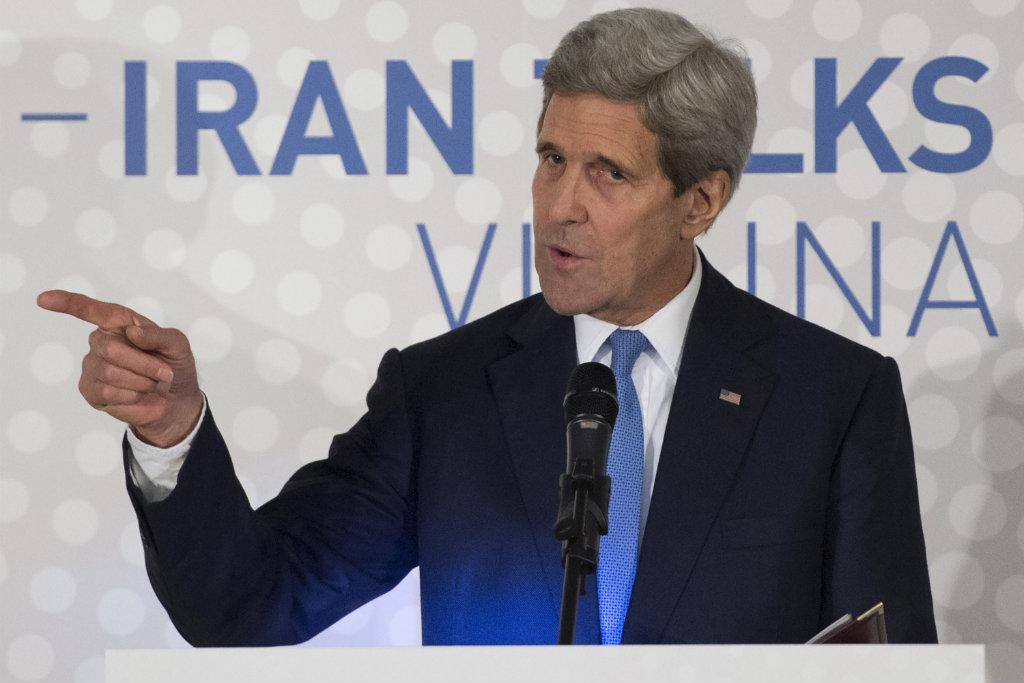Extending nuclear talks with Iran is first good news from Middle East in a long time
US Secretary of State John Kerry delivers a statement in Vienna on the status of negotiations over Iran’s nuclear program before he leaves Vienna on Nov. 24, 2014. Kerry defended extending a deadline for a deal with Iran, saying “real and substantial progress” was made during talks in Vienna and calling on US lawmakers not to impose new sanctions on Tehran.
PROVIDENCE, Rhode Island — The international nuclear negotiations with Iran are close enough to succeed so the talks are being extended to next year. The new deadlines are March for a political agreement and June for the full final signatures.
The deal will mean Iran agrees to make abundantly verifiable the entirely peaceful character of its civilian nuclear energy program and thereby cancel out Western suspicions that Iran’s ambition is for a weapon.
An accord would constitute the first truly good news out of the Middle East in a long while. If we peacefully settle this dispute it would mean an historic opportunity to get policy right in that area of the world.
The widespread anticipation leading up to Monday’s missed deadline is because the key needs of all sides are well served by settling the dispute and moving on.
Iran is poised to agree to severely and verifiably limit its nuclear materials production in exchange for relief from international economic sanctions, which will take place over time. Such a handshake is decades in the making and it must happen.
The deal would let the US stop escalating hostilities and end punishments against Iran. Why is this to be celebrated? Because when diplomacy and economic tools fail, we use military force. But at this point, the US and our allies have no appetite to bomb Iran’s suspected nuclear sites and risk inevitable retaliation.
We can’t solve this dispute with other elements of national power. Instead, we should accept the victory that can be achieved at the negotiating table.
After 35 years of vilifying and challenging one another, the US and Iran can finally reach a sustainable win-win. This does not mean the US-Iran relationship is repaired. We will benefit across the board from trading Iran its potential nuclear development for increased access to world trade and finances: Security will be safeguarded; global trade will gradually unfurl to blossom; regional stability will increase; and we can confront extremist threats like ISIS more effectively.
To be sure, a nuclear agreement has to work. But that is more good news. The UN’s International Atomic Energy Agency has decades of technical expertise in verifying and monitoring agreements of this sort.
The technical challenges are not the sticky wicket. Rather, it has been the politics that has consistently held up a negotiated outcome and that remains at risk.
With Republicans taking over the US Senate in January, Congress will greatly amplify its call to hammer Iran with sanctions. The argument is that since sanctions brought Iran to the negotiating table, then more pressure from sanctions will yield still greater benefits.
That is not only wrongheaded, it risks the success at hand. We can’t bully Iran into this agreement. Political self-interest in both the US and Iran align — we both gain — and that is what makes the deal possible.
Some of our allies worry about the agreement increasing Iran’s influence in the region. But the fact is Iran is a regional superpower because of its location, population and energy — all of which are inalienable.
Settling the nuclear dispute means that less aggressive Iranian behavior would be incentivized as it gains from participating in the global economic community. Israel will also benefit, as its principal concern is to keep Iran from developing a nuclear weapon; an agreement next year would accomplish that.
Iran’s large population of mostly young people needs economic growth and an end to international isolation. Outsiders often think the Islamic autocracy is immune to domestic public opinion but that is a serious misjudgment. Iran’s leadership knows it needs to get out from under the international sanctions and Iran’s President Rouhani is staking his political fortunes on successfully ending the dispute with the West.
An agreement would be a watershed event well worth celebrating. We could avoid further escalating hostilities, we could stop talking about attacking Iran, oil prices won’t skyrocket, and we could work in parallel to combat enduring challenges like stability in Iraq and Afghanistan, and in fighting violent extremist threats like ISIS, the Taliban, and Al-Qaeda. All this can be done with diplomacy, not force. If only we don’t blow it.
Jo-Anne Hart is adjunct professor of international studies at Brown University’s Watson Institute for International Studies, and a professor at Lesley University in Cambridge, Mass.
Every day, reporters and producers at The World are hard at work bringing you human-centered news from across the globe. But we can’t do it without you. We need your support to ensure we can continue this work for another year.
Make a gift today, and you’ll help us unlock a matching gift of $67,000!
